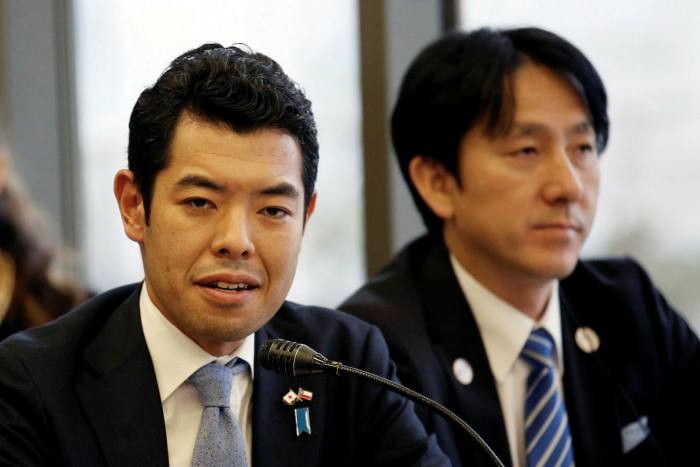In a Japanese election that has struggled to ignite much public enthusiasm between uniform candidates trotting out similar campaign pledges, Kiyoto Tsuji is an outlier.
Having spent half of his life in Canada and the US, the 42-year-old father of two has built his support around his multicultural roots and promises of generational change even as his Liberal Democratic party has struggled to project a different image under Fumio Kishida.
The new prime minister is gambling on a quick election victory on Sunday to secure the public mandate and solid base to rejuvenate a stagnant economy still recovering from the Covid-19 pandemic.
Tsuji, who grew up in Vancouver before attending Columbia University, is one of the luckier LDP candidates. In what analysts said would be one of the toughest election battles for the LDP in almost a decade, the former vice-minister for foreign affairs is running against four opponents in the Tokyo 2nd electoral district.
In many other constituencies, his parliamentary colleagues face only a single opponent after Japan’s opposition parties finally managed to unify in an attempt to break the LDP’s dominance.
The five opposition parties have fielded a unified candidate in 213 out of 289 first-past-the-post constituencies. Just 1,051 candidates — the lowest on record — are competing for 465 seats in the Diet’s lower house. Women account for fewer than 20 per cent of the runners.
“I think we will have a tougher time than in past elections when there were more choices to be made,” Tsuji said before delivering his stump speech to a small crowd gathered in the rain last week.
“But for me, this election will be a jumping-off board for our generation to change the way we do things in Nagatacho [Tokyo’s version of Capitol Hill]. We need more diversity,” added Tsuji, who renounced his Canadian citizenship in 2000 to pursue a political career in Japan.
Tsuji, who was raised by a single mother, has pushed for wider childcare support and a strengthening of Japan’s foreign policy to address China’s rise.
The LDP has long benefited from disarray among Japan’s opposition parties. But the newfound unity makes the opposition a more formidable prospect this year.
Even LDP heavyweights and cabinet members, such as the new secretary-general Akira Amari and Kenji Wakamiya, minister for the 2025 World Expo in Osaka, could be fighting a tight one-on-one contest.
The ruling party faced a crisis over the summer as public backing for then prime minister Yoshihide Suga collapsed over his mixed handling of the coronavirus pandemic. Support for the LDP has recovered slightly since then as Covid-19 cases fell sharply and vaccination rates topped those in the US and the UK.
While Kishida won the LDP leadership race this month by offering stability and continuity, he faces the challenge of reviving the world’s fastest ageing nation that has been stuck in near-permanent deflation.
Voters are seeking clarity on how his promises of “a new form of capitalism” will differ from former prime minister Shinzo Abe’s programme of aggressive monetary easing and economic stimulus.
His goal of a fairer distribution of income also echoes the stance of the opposition camp, blurring the lines of debate between the contesting parties.
“I don’t feel the determination from Prime Minister Kishida that he will change the LDP,” Mayumi Sakuma, a Tokyo-based voter in her 60s, said. “My life didn’t really improve under Mr Abe and I feel like the LDP needs to be punished this time.”
A mother of a three-year-old in her 30s, who only gave her surname as Hayami, also struggled to muster any enthusiasm for the ruling party.
“I don’t feel like there is much change under prime minister Kishida,” she said. “So I don’t support the LDP but I am voting for Mr Tsuji because he is part of the younger generation raising kids.”
Kishida has set a low bar for the ruling coalition of the LDP and Komeito, the centrist party and its long-term partner, aiming to merely hang on to their majority control of the 465 lower house seats.
Recent polls are split over whether the LDP can maintain control on its own by securing 233 seats. If it failed to do so, analysts said the prime minister’s position ahead of upper house elections next year would be at risk.
According to the latest poll by Asahi newspaper, the LDP, which has 276 seats, is forecast to win 251 seats, but could get as many as 279. Komeito is expected to win up to 37 seats.
Despite the unified strategy, the main opposition Constitutional Democratic Party of Japan, which has 109 seats, is only expected to win between 94 to 120 seats.
“The sense of crisis within the LDP does seem to be waning since there is 99.9 per cent no chance of a change in government,” said Masatoshi Honda, a political analyst. “But there is a risk that no real winner will emerge from this election.”


